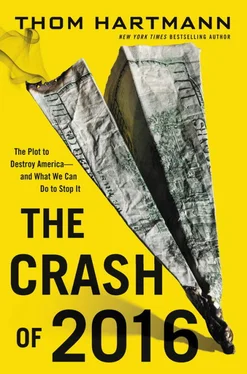In other words, they can do on a local level all the things austerity-obsessed technocrats can do in Europe.
“This is a state takeover,” Reverend Bullock told me. “The vote does not count—it’s null and void. We’ve got Michigan, the new Mississippi, where liberty is being lynched.” 134
Snyder’s “financial managers” had been installed to replace democratically elected officials in the cities of Flint, Ecorse, Benton Harbor, Pontiac, and Reverend Bullock’s Highland Park.
“What’s it like to live under tyranny? What’s it like to live under dictatorship?” Reverend Bullock asked rhetorically. “How about no police officers? How about limited firefighters? How about taking streetlights out of cities so that people are in the dark from five p.m. to roughly eight a.m.? How about living with low morale and despair?
“This is about dismantling democracy,” Reverend Bullock concluded. 135
In November 2012, organized people of Michigan gathered enough signatures to put Governor Snyder’s little-dictators law on the ballot for repeal. And voters did indeed repeal the law in that election.
But at the beginning of 2013, the Republicans in the Michigan state legislature passed a carbon copy of the law, Snyder signed it, and it was again back on the books, against the people’s will. Within months, Snyder announced he deemed the entire city of Detroit to be in a “financial emergency” and appointed one of his little dictators to oversee the city’s deconstruction.
One-half of the entire black population in Michigan is now shut out of democracy and under the control of these “financial managers.”
Reporter Andy Kroll at Mother Jones magazine traces the origins of this law to the Mackinac Center for Public Policy, noting, “the free-market-loving center published four recommendations, including granting emergency managers the power to override elected officials (such as a mayor or school board member) and toss out union contracts. All four ended up in Snyder’s legislation.” 136
The Mackinac Center is affiliated with the Heritage Foundation, one of the many Royalist think tanks spawned from the Powell Memo, and the Center has received tens of thousands of dollars in funding, that we know of, from the Koch brothers.
When corporate-funded think tanks are doing the work of our democratically elected lawmakers, there’s something seriously wrong.
The ALEC Shadow Government
For more than a decade, Marc Pocan (now a member of the US House of Representatives) was regularly elected every two years by his constituents in the Seventy-Eighth District of Wisconsin to represent their interests in the Wisconsin State Assembly. In fact, he won 93 percent of the vote in his first bid back in 1998.
But, Representative Pocan soon learned, in Royalist America, there’s no place for him, or his constituents, in government anymore.
Pocan realized this when he attended the annual convention of the American Legislative Exchange Council, better known as ALEC, down in New Orleans back in August 2011.
Established in 1973, ALEC claims on its website that its mission is “to advance the Jeffersonian principles of free markets, limited government, federalism, and individual liberty, through a nonpartisan public-private partnership of America’s state legislators, members of the private sector, the federal government, and general public.” 137
But Representative Pocan had a different take on ALEC. “Literally, it’s a dating service setting up corporate lobbyists and state legislators,” he told me. “The culmination is the passing of special-interest legislation.” 138
Over the past few decades, the job of writing and passing legislation, which used to take place in the halls of state governments across the nation and in Congress by lawmakers who were elected by the people, has been outsourced to—or hijacked by—ALEC.
And contrary to any definitions of democracy we were taught in school, less than half of the policy makers of ALEC are actually elected officials. The majority are very, very wealthy corporate interests residing in the top 1 percent who are trying to occupy the thrones once belonging to feudal lords.
State representatives such as Mark Pocan and other members of Congress can join ALEC for an annual membership fee of $50. Currently there are about two thousand members of ALEC who are elected officials and they make up less than 2 percent of the organization’s annual funding, which in 2009 was nearly $7 million. 139
The majority of policy makers within ALEC are corporate executives and lobbyists, who pay a membership fee of between a few thousand dollars and as much as a couple hundred thousand dollars, depending on how much influence they want within ALEC, plus annual dues. That’s where ALEC gets roughly 98 percent of its funding, along with stand-alone, hefty corporate, foundation, and personal contributions. For example, at the 2011 convention, BP—fresh from its oil catastrophe in the Gulf—was at the top of the list of donors to ALEC, likely dishing out as much as $100,000. 140Other donors included ExxonMobil (the most profitable corporation in the history of the world), Shell, Chevron, Wal-Mart, Visa, and a name Americans have increasingly come to know: Koch Industries. 141
All that money dished out by all the corporations buys them equal standing in the ALEC “democracy.”
In the same way state and federal governments divide their work into committees (such as the House Energy and Commerce Committee in Congress, or the Public Health and Public Safety Committee in the Wisconsin State Assembly), ALEC also breaks up into committees—or what it calls “task forces.” There are seven of them in total, involving all the same areas congressional committees cover:
• Commerce, Insurance, and Economic Development
• Communications and Technology
• Education
• Energy, Environment, and Agriculture
• Health and Human Services
• International Relations
• Tax and Fiscal Policy
Within each ALEC “task force,” both elected legislators and corporate lobbyists are represented equally—fifty-fifty. The two sides sit together and then discuss and mark up what they aim to one day make actual legislation, based in large part on what was taught in earlier workshops.
Walking around an ALEC convention, you’d probably feel like you were at a high school civics fair or a Model UN Conference. There’re a few thousand men and women in suits milling about, attending corporate-funded workshops, all with one central theme: profitization.
From ways corporations can make a profit from our public education system, to ways corporations can skim more and more off the top of Medicare, to ways corporations can avoid pollution regulations—it all comes down to finding new ways to convert the public good and the public trust into the private profit, just as the Goldman Sachs–trained technocrats in Europe are doing.
And, like attentive students, state lawmakers sit quietly and are spoon-fed by faux, corporate-funded climate change “scientists,” speakers who twist the words of Jefferson and other Founders to unintelligibility, and free-market “economists.”
“They literally referred to the legislators as the football team,” Pocan said, “and the corporate lobbyists making presentations were our coaches. Those were their words.” 142
It’s the ultimate culmination of the Powell Memo.
As Pocan put it, the legislators were “being given their game plans” before they were shuffled off to the next phase of the ALEC convention—the “task force” meetings.
“You need a majority vote from each group for something to advance,” Pocan told me, referring to the corporations on the ALEC task forces. 143“So not only do they write the legislation but then they vote on the legislation for it to move forward.”
Читать дальше












